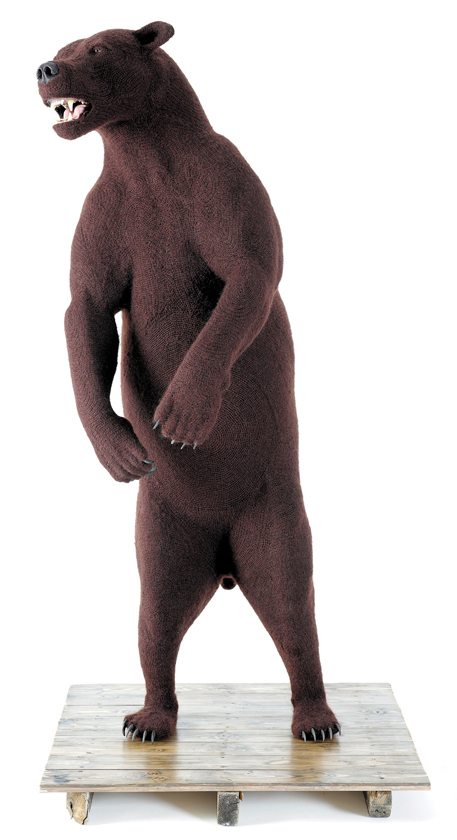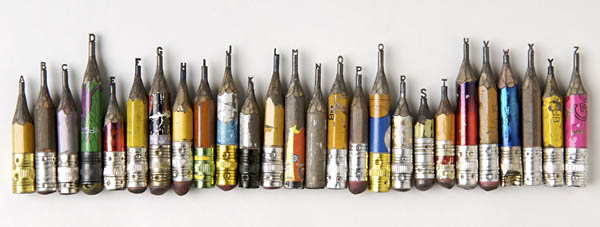Power of Making, Victoria and Albert Museum | reviews, news & interviews
Power of Making, Victoria and Albert Museum
Power of Making, Victoria and Albert Museum
There's something for everyone in this hectic celebration of craft and design

Hands on! Power of Making has it all: one of the most surprising and exciting collections of contemporary stuff on view for many a while. Some is functional, from coffins to bicycles, wine caskets, guns, bespoke shoes.
As well as hand-done work there are lots of new machines, as artists learn to collaborate with 3D replicators, and other high-tech bits - part of the future evidently being machines which send data to other machines which then make the actual thing, untouched by human hand. Humans of course do the inventing and the programming; only now are we within sight of making a machine which can replicate human dexterity.
How did Daniel Charny, the outsider curator (tutor at the Royal College, inventor, product designer) and his colleagues make this anthology of high-tech and low-tech objects so fascinating and unexpected? The net has been cast wide from folk art to high fashion. From the work of artists, inventors, designers, scientists and craftsmen we see how things – ranging from the eminently practical to the totally useless, the gorgeous to the bizarre, the mysterious to the visually articulate – are made today.
 The V&A is the natural home for this groundbreaking exhibition, as the collection was set up to provide exemplars for the practice of innovative and profitable design (just for starters, the museum houses Sir Alexander Issigonis’s drawings for the Morris Mini Minor, as well as Constable’s sketchbooks). Power of Making is the second triannual show in collaboration with the Crafts Council.
The V&A is the natural home for this groundbreaking exhibition, as the collection was set up to provide exemplars for the practice of innovative and profitable design (just for starters, the museum houses Sir Alexander Issigonis’s drawings for the Morris Mini Minor, as well as Constable’s sketchbooks). Power of Making is the second triannual show in collaboration with the Crafts Council.
Here is a commemorative quilt from Bosnia, for Srebrenica, from an amateur collective, and there Andrew Loudon’s dry stone wall, showing four different building techniques. On view is a lion coffin from Ghana, Alexander McQueen’s Armadillo Shoes, and glittering in its glass case the metallic flow of Susie MacMurray’s marvellously unwearable ball gown for a widow made out of 100,000 dressmaker pins (no safety pins here).
Who would have thought that protheses would be so engaging? Well, it may come to us all. Among the array on view: David Carpenter’s artificial eyes for Moorfields Hospital, Aviya Serfaty’s very airy artificial leg made out of carbon fibre, air and a flexible skin, and artificial shins in various media; the glass artist Matt Duran with his mesmerising prototypes of noses for future transplant; Peter Butcher’s surgical implant which has embroidered flowers all round for the surgeon’s sutures; Damien O’Sullivan provides a Delft eye patch, fetching elbow crutch and the like; TouchBionics' i-LIMB electronic prosthetic arm, a marvel in which each finger can be moved separately by its wearer.
Michael Thompson’s all-wood Splinter Bike, low-tech and obsessively hand-done, has broken the speed record (11.25mph) for wooden bicycles. It was made in a shed in Norwich. At the other end of the spectrum there are four collaborators and manufacturers for a lady’s version of the Bio Suit, the latest extra-vehicular space suit (just as all space journeys are ending, of course).

Some of the most subtle works on view are Dalton Ghetti’s three Pencil Tip Art pieces, a procession of 26 wooden pencil stubs (pictured above) standing to attention, each protruding bit of lead carved painstakingly by hand into a letter of the alphabet. Designer Charlie Le Mindu does a riff – Blond Lips - on Mae West, partly made of human hair, and as worn by Lady Gaga.
The whole considered glittering, gleaming heap of things is a mix of contemporary craft and the unconventional. There is furniture in the shape of John Makepeace’s wavy golden Sand Cabinet, traditional craftsmanship exemplified in the handmade bespoke shoes from Lobb of St James’s (founded 1849) and wicker coffins made from Somerset wetlands willow from the 200-year-old firm PH Coate and Son. To nudge us into the now, there is an alarmingly life-like and life-size edible Baby Cake, lying on its back, all dressed up in nightgown, cap and booties, by Michelle Wibowo.
Like it, love it or loathe it, there is not a single thing on view here that is not worth looking at. This compilation of 100 or so "makers", or artists, or craftsmen, or what you will, is more than fresh air: a visit makes you feel you are high from your very own tank of oxygen. I went for an hour and stayed for the day. Terrific.
- Power of Making at the Victoria and Albert Museum until 2 January, 2012
 Find Power of Making: The Case for Making and Skills edited by Daniel Charny on Amazon
Find Power of Making: The Case for Making and Skills edited by Daniel Charny on Amazon
Share this article
The future of Arts Journalism
You can stop theartsdesk.com closing!
We urgently need financing to survive. Our fundraising drive has thus far raised £49,000 but we need to reach £100,000 or we will be forced to close. Please contribute here: https://gofund.me/c3f6033d
And if you can forward this information to anyone who might assist, we’d be grateful.

Subscribe to theartsdesk.com
Thank you for continuing to read our work on theartsdesk.com. For unlimited access to every article in its entirety, including our archive of more than 15,000 pieces, we're asking for £5 per month or £40 per year. We feel it's a very good deal, and hope you do too.
To take a subscription now simply click here.
And if you're looking for that extra gift for a friend or family member, why not treat them to a theartsdesk.com gift subscription?
more Visual arts
 'We are bowled over!' Thank you for your messages of love and support
Much-appreciated words of commendation from readers and the cultural community
'We are bowled over!' Thank you for your messages of love and support
Much-appreciated words of commendation from readers and the cultural community
 Folkestone Triennial 2025 - landscape, seascape, art lovers' escape
Locally rooted festival brings home many but not all global concerns
Folkestone Triennial 2025 - landscape, seascape, art lovers' escape
Locally rooted festival brings home many but not all global concerns
 Sir Brian Clarke (1953-2025) - a personal tribute
Remembering an artist with a gift for the transcendent
Sir Brian Clarke (1953-2025) - a personal tribute
Remembering an artist with a gift for the transcendent
 Emily Kam Kngwarray, Tate Modern review - glimpses of another world
Pictures that are an affirmation of belonging
Emily Kam Kngwarray, Tate Modern review - glimpses of another world
Pictures that are an affirmation of belonging
 Kiefer / Van Gogh, Royal Academy review - a pairing of opposites
Small scale intensity meets large scale melodrama
Kiefer / Van Gogh, Royal Academy review - a pairing of opposites
Small scale intensity meets large scale melodrama
 Jenny Saville: The Anatomy of Painting, National Portrait Gallery review - a protégé losing her way
A brilliant painter in search of a worthwhile subject
Jenny Saville: The Anatomy of Painting, National Portrait Gallery review - a protégé losing her way
A brilliant painter in search of a worthwhile subject
 Abstract Erotic, Courtauld Gallery review - sculpture that is sensuous, funny and subversive
Testing the boundaries of good taste, and winning
Abstract Erotic, Courtauld Gallery review - sculpture that is sensuous, funny and subversive
Testing the boundaries of good taste, and winning
 Edward Burra, Tate Britain review - watercolour made mainstream
Social satire with a nasty bite
Edward Burra, Tate Britain review - watercolour made mainstream
Social satire with a nasty bite
 Ithell Colquhoun, Tate Britain review - revelations of a weird and wonderful world
Emanations from the unconscious
Ithell Colquhoun, Tate Britain review - revelations of a weird and wonderful world
Emanations from the unconscious
 Rachel Jones: Gated Canyons, Dulwich Picture Gallery review - teeth with a real bite
Mouths have never looked so good
Rachel Jones: Gated Canyons, Dulwich Picture Gallery review - teeth with a real bite
Mouths have never looked so good
 Yoshitomo Nara, Hayward Gallery review - sickeningly cute kids
How to make millions out of kitsch
Yoshitomo Nara, Hayward Gallery review - sickeningly cute kids
How to make millions out of kitsch
 Hamad Butt: Apprehensions, Whitechapel Gallery review - cool, calm and potentially lethal
The YBA who didn’t have time to become a household name
Hamad Butt: Apprehensions, Whitechapel Gallery review - cool, calm and potentially lethal
The YBA who didn’t have time to become a household name

Add comment